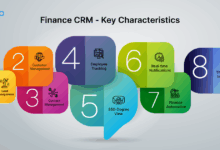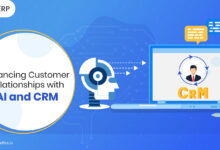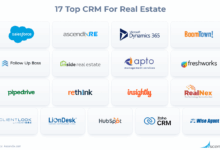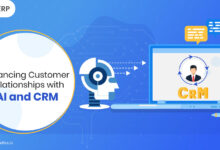CRM Software For Small Business: Streamlining Operations And Enhancing Growth
CRM Software for Small Business revolutionizes the way small businesses manage customer relationships, streamline operations, and drive growth. Dive into this comprehensive guide to unlock the potential of CRM software tailored for small business success.
Explore the key features, benefits, implementation processes, best practices, challenges, and future outlook of CRM software to empower your small business with effective customer management tools.
Introduction to CRM Software for Small Business
CRM software, or Customer Relationship Management software, is a tool that helps small businesses manage interactions with customers and potential customers. It is designed to streamline processes, improve customer relationships, and increase sales.
Key Features of CRM Software for Small Business
- Centralized Customer Data: CRM software stores all customer information in one place, making it easy to access and update.
- Automated Task Management: CRM software automates tasks such as sending follow-up emails, scheduling appointments, and tracking leads.
- Lead Management: Small businesses can track and manage leads effectively, ensuring no potential customer falls through the cracks.
- Customer Communication: CRM software allows businesses to communicate with customers through various channels like email, phone, and social media.
- Analytics and Reporting: Small businesses can track sales performance, customer interactions, and marketing campaigns to make data-driven decisions.
Types of CRM Software for Small Business
In the world of CRM software, there are different types tailored for small businesses to choose from. Each type offers unique features and benefits that cater to specific business needs.
Cloud-Based CRM Software
Cloud-based CRM software is a popular choice for small businesses as it allows for easy access to customer data from anywhere with an internet connection. Examples of cloud-based CRM software include Salesforce, HubSpot, and Zoho CRM. These platforms offer scalability, customization, and integration with other business tools.
On-Premise CRM Software
On-premise CRM software is installed and maintained on the company’s own servers. While this type of CRM software offers more control over data security and customization, it requires a higher upfront investment. Popular on-premise CRM options for small businesses include Microsoft Dynamics CRM and SAP CRM.
Open-Source CRM Software
Open-source CRM software gives small businesses the flexibility to customize the software according to their specific needs. Examples of open-source CRM software options include SuiteCRM and SugarCRM. While open-source solutions are cost-effective, they may require technical expertise for setup and maintenance.
Mobile CRM Software
Mobile CRM software is designed for businesses that need to access customer data on the go. These solutions are optimized for mobile devices, allowing sales teams to manage leads, contacts, and opportunities from anywhere. Popular mobile CRM options for small businesses include Pipedrive and Insightly.
Industry-Specific CRM Software
Industry-specific CRM software is tailored to meet the unique requirements of businesses operating in specific sectors. For example, there are CRM solutions designed for real estate, healthcare, and e-commerce industries. These industry-specific CRM options often come with pre-built features and integrations that cater to the needs of businesses in that sector.
Benefits of Implementing CRM Software
Implementing CRM software for small businesses can bring a multitude of benefits that can significantly enhance customer management, sales, marketing, and overall business operations. Let’s explore some of the key advantages below.
Improved Customer Relationships and Retention
- CRM software allows businesses to centralize customer data, making it easier to understand customer needs and preferences.
- By having a comprehensive view of customer interactions, businesses can provide personalized services and build stronger relationships.
- Tracking customer behavior and feedback through CRM software enables businesses to proactively address issues and improve customer satisfaction, leading to higher retention rates.
Enhanced Sales and Marketing Efforts
- CRM software provides insights into customer buying patterns, allowing businesses to tailor marketing campaigns for better targeting and higher conversion rates.
- Automation features in CRM software streamline sales processes, making it easier for sales teams to manage leads and close deals more efficiently.
- Integration with marketing tools enables businesses to create targeted campaigns, track results, and adjust strategies based on real-time data.
Streamlined Communication with Customers
- CRM software centralizes communication channels, making it easier for businesses to engage with customers across various platforms like email, phone, and social media.
- Automated reminders and notifications help businesses stay in touch with customers, ensuring timely follow-ups and personalized interactions.
- Real-time updates on customer interactions allow teams to respond promptly to inquiries, resolve issues, and provide seamless customer service.
Tracking Customer Interactions and Behavior
- CRM software captures every customer interaction, including purchases, inquiries, and feedback, providing a comprehensive view of the customer journey.
- Analytics tools in CRM software help businesses analyze customer behavior, identify trends, and forecast future needs to tailor products and services accordingly.
- Segmentation features allow businesses to target specific customer groups with personalized offers and promotions, increasing customer engagement and loyalty.
Personalized Marketing Campaigns
- CRM software enables businesses to create targeted marketing campaigns based on customer preferences, behavior, and past interactions.
- Segmentation tools help businesses categorize customers into different groups for personalized messaging and offers.
- Automation features in CRM software can schedule and send out marketing emails, track responses, and adjust strategies for better engagement.
Data Analytics and Informed Decision-Making
- CRM software provides valuable insights through data analytics, helping businesses make informed decisions based on customer trends, preferences, and feedback.
- Customizable reports and dashboards allow businesses to track key performance indicators, measure success, and identify areas for improvement.
- By leveraging data analytics, businesses can optimize marketing strategies, improve customer service, and drive overall business growth.
Automation and Time-Saving Benefits
- Automation in CRM software simplifies repetitive tasks, such as data entry, follow-ups, and lead nurturing, saving time for small business owners and employees.
- Automated workflows ensure consistency in customer interactions, reducing manual errors and improving efficiency in daily operations.
- Integration with other business tools and applications further enhances productivity and streamlines processes for better business performance.
Scalability and Growth Opportunities
- CRM software is scalable and can adapt to the growing needs of small businesses, accommodating more customers, data, and functionalities as the business expands.
- Customizable features and modules in CRM software allow businesses to tailor the system to their specific requirements, ensuring flexibility and scalability for future growth.
- As the business evolves, CRM software can support additional users, integrations, and advanced functionalities to meet the changing demands of a growing customer base.
Key Features to Look for in CRM Software
When choosing CRM software for your small business, it is crucial to consider key features that can help streamline your operations and improve customer relationships. Here are some essential features to look for:
Customization and Integration Capabilities
CRM software with customization and integration capabilities allows you to tailor the system to meet your specific business needs. It enables seamless integration with other tools and applications you use, enhancing efficiency and productivity.
Reporting and Analytics Tools
Reporting and analytics tools in CRM software provide valuable insights into customer behavior, trends, and sales performance. By analyzing data, you can make informed decisions, identify opportunities for growth, and optimize your marketing strategies.
Automation Features
Automation features in CRM software help streamline repetitive tasks, such as lead management, email marketing, and follow-ups. By automating these processes, you can save time, reduce human error, and focus on more strategic activities to drive business growth.
Mobile Accessibility
Mobile accessibility in CRM software enables you and your team to access important customer data, update records, and communicate on-the-go. This flexibility improves remote work efficiency, allowing you to stay connected and responsive no matter where you are.
User-Friendly Interfaces
A user-friendly interface is essential for improving user adoption and productivity. Intuitive navigation, easy data entry, and clear visuals make it easier for your team to use the CRM software effectively, leading to better engagement and results.
Implementation Process of CRM Software
Implementing CRM software for a small business involves several key steps to ensure a successful integration and utilization of the system.
Key Features to Consider When Selecting CRM Software
- Scalability to accommodate business growth
- User-friendly interface for easy adoption
- Mobile accessibility for remote usage
- Integration capabilities with other tools
- Customization options to tailor the software to specific business needs
Importance of Customization Options in CRM Software
Customization options in CRM software are crucial as they allow small businesses to adapt the system to their unique processes, workflows, and customer interactions. By customizing the software, businesses can maximize efficiency and effectiveness in managing customer relationships.
Integration Process of CRM Software with Existing Tools
Integrating CRM software with existing tools and systems within a small business environment requires seamless connectivity and data transfer. The integration process ensures that all platforms work together harmoniously, providing a unified view of customer data and interactions.
Role of Data Security Measures in CRM Software Implementation
- Implementing encryption protocols to safeguard sensitive customer information
- Regularly updating security patches to prevent vulnerabilities
- Ensuring compliance with data protection regulations such as GDPR or CCPA
- Training employees on data security best practices
Best Practices for Testing and Quality Assurance
- Conducting thorough testing of the CRM software before full implementation
- Engaging end-users in the testing process to gather feedback
- Ensuring data migration is accurate and complete
- Providing training sessions for employees on using the CRM software effectively
Best Practices for Using CRM Software
In order to maximize the benefits of CRM software in a small business setting, it is important to follow some best practices. These practices can help ensure data security, drive business growth, customize the software to meet unique needs, and effectively train employees for efficient usage.
Ensuring Data Security and Privacy
- Regularly update and patch CRM software to protect against security vulnerabilities.
- Implement access controls to restrict sensitive data to authorized personnel only.
- Encrypt data both in transit and at rest to prevent unauthorized access.
- Conduct regular security audits to identify and address any potential weaknesses in the system.
Utilizing CRM Software for Business Growth
- Set clear goals and objectives for CRM implementation to align with business growth strategies.
- Leverage CRM analytics to gain insights into customer behavior and preferences for targeted marketing campaigns.
- Integrate CRM with other business tools to streamline processes and improve efficiency.
- Regularly monitor and analyze CRM data to identify trends and opportunities for business expansion.
Customizing CRM Software for Unique Needs
- Identify key business processes and workflows that can be automated or streamlined through CRM customization.
- Work closely with CRM vendors or developers to tailor the software to specific business requirements.
- Create custom fields, reports, and dashboards to track and analyze data relevant to the business.
- Regularly review and update customization to ensure it continues to meet evolving business needs.
Training Employees Efficiently on CRM Software
- Provide comprehensive training sessions for employees on how to use CRM software effectively.
- Create user manuals, video tutorials, and FAQs to support ongoing learning and troubleshooting.
- Encourage hands-on practice and offer continuous support for employees as they familiarize themselves with the software.
- Monitor user adoption and gather feedback to identify areas for improvement in training programs.
Integration of CRM Software with Other Business Tools
Integrating CRM software with other essential tools can significantly enhance the efficiency and productivity of small businesses. Seamless integration allows for streamlined processes and better management of customer data.
Email Marketing Platforms
Integrating CRM software with email marketing platforms is crucial for small businesses to effectively reach out to customers. By syncing customer data between the two systems, businesses can create targeted and personalized email campaigns based on customer interactions and preferences.
Accounting Software
Seamless integration between CRM software and accounting software is essential for small businesses to track customer transactions, invoices, and payments efficiently. By syncing these systems, businesses can gain a comprehensive view of customer interactions and financial transactions in one place.
Third-Party Applications
- Integration with project management tools like Trello or Asana for better collaboration and task management.
- Integration with social media platforms like Facebook or Twitter for monitoring customer interactions and engagement.
- Integration with customer support tools like Zendesk or Freshdesk for improved customer service and issue resolution.
Cost Considerations for Small Business CRM Software
When it comes to implementing CRM software for a small business, understanding the costs involved is crucial. Let’s break down the typical expenses, compare pricing models, and explore the potential return on investment (ROI) for small businesses.
Breakdown of Costs
- Subscription Fees: Most CRM software providers offer subscription-based pricing models where businesses pay a monthly or annual fee for using the software.
- Implementation Costs: This includes initial setup, configuration, data migration, and training expenses. Some providers may charge extra for these services.
- Customization Fees: If your business requires specific customizations or integrations, there might be additional costs involved.
- Support and Maintenance: Ongoing support and maintenance fees are common with CRM software to ensure smooth operation and updates.
Comparison of Pricing Models
- Pay-Per-User: Some CRM software providers charge based on the number of users accessing the system, making it suitable for small businesses with a limited team.
- Feature-Based: Other providers offer tiered pricing based on the features and functionalities needed, allowing businesses to choose a plan that aligns with their requirements.
- Free Versions: There are CRM software options available for small businesses with limited budgets that offer basic features for free, with the option to upgrade as the business grows.
Potential ROI of CRM Software
Implementing CRM software can lead to increased efficiency, better customer relationships, streamlined processes, and improved sales opportunities, ultimately resulting in a positive return on investment for small businesses.
Common Challenges Faced in CRM Software Adoption
Implementing CRM software in a small business can present several challenges that need to be addressed for successful adoption. These challenges can range from employee resistance to data quality issues, but with the right strategies and best practices, businesses can overcome these obstacles seamlessly.
Resistance to CRM Software Adoption
Employee resistance to CRM software adoption is a common challenge faced by small businesses. To overcome this, it is essential to involve employees in the decision-making process, provide comprehensive training, and highlight the benefits of using CRM software for their daily tasks.
Data Quality Issues
Maintaining accurate and up-to-date data in CRM software is crucial for its effectiveness. Businesses can address data quality issues by establishing data governance policies, conducting regular data audits, and leveraging features like data validation and automation to ensure data accuracy.
Streamlining Sales Processes
CRM software offers specific features that can help streamline sales processes, such as lead scoring, pipeline management, and automated task assignments. By utilizing these features effectively, businesses can enhance their sales efficiency and drive revenue growth.
Customization Options
The importance of customization options in CRM software cannot be overstated, especially for meeting the unique needs of different businesses. Businesses should look for CRM solutions that offer flexible customization capabilities to tailor the software to their specific workflows and requirements.
Integration with Existing Tools
Integrating CRM software with existing tools and systems within a company is crucial for maximizing efficiency and productivity. Best practices for integration include selecting CRM software with robust integration capabilities, mapping out integration workflows, and ensuring seamless data flow between systems.
Trends in CRM Software for Small Business
In today’s fast-paced business environment, staying up-to-date with the latest trends in CRM software is crucial for small businesses looking to enhance customer relationships and drive sales. Let’s explore some of the key trends shaping the CRM landscape for small businesses.
Integration of AI and Automation
With advancements in artificial intelligence (AI) and automation, CRM software for small businesses is increasingly incorporating these technologies to streamline processes and improve customer interactions. AI-powered analytics can provide valuable insights into customer behavior, while automation features can help businesses personalize communication and automate repetitive tasks.
Evolution of Cloud-Based Solutions
Cloud-based CRM solutions are gaining popularity among small businesses due to their flexibility, scalability, and cost-effectiveness. Migrating to a cloud-based platform allows businesses to access real-time data, collaborate seamlessly across teams, and integrate with other business tools more efficiently. However, challenges such as data security and customization may need to be addressed during the migration process.
Successful Implementation and Impact
Small businesses that have successfully implemented CRM software have seen a significant impact on their customer engagement and sales growth. By centralizing customer data, tracking interactions, and automating marketing campaigns, businesses can deliver personalized experiences and build long-lasting relationships with their customers. Examples of companies leveraging CRM software for small businesses, such as Zoho CRM or HubSpot CRM, showcase the positive outcomes of effective implementation strategies.
Case Studies of Successful CRM Software Implementation
Implementing CRM software can bring about significant benefits for small businesses. Let’s explore some real-world examples of companies that have successfully leveraged CRM software to achieve growth and improve customer satisfaction.
Company A: E-commerce Store
- Company A, an e-commerce store, implemented CRM software to streamline customer interactions and personalize marketing campaigns.
- By tracking customer preferences and purchase history, Company A was able to send targeted promotions, resulting in a 20% increase in sales within the first year.
- Customer satisfaction also improved as customers received personalized recommendations and timely support through the CRM system.
Company B: Consulting Firm
- Company B, a consulting firm, adopted CRM software to manage client relationships more efficiently and track project progress.
- With the help of CRM software, Company B was able to centralize client information, leading to better coordination among team members and increased client retention rates.
- The automation of follow-up tasks and reminders improved communication with clients and enhanced overall service quality.
Customization Options in CRM Software for Small Business
Customization features in CRM software play a crucial role in meeting the unique needs of small businesses. By tailoring the software to align with specific industry requirements, businesses can enhance efficiency and productivity. Let’s delve into the importance of customization options in CRM software for small businesses.
Tailoring CRM Software to Industry Requirements
Small businesses can customize CRM software to cater to their specific industry needs. For example, a retail business may require fields for tracking customer preferences or purchase history, while a service-based company may need fields for scheduling appointments or tracking service requests. CRM software allows businesses to create custom fields and workflows to streamline operations.
- Customizable Fields: Small businesses can create custom fields in CRM software to track unique data points. For instance, they can add fields for customer birthdays, referral sources, or specific product interests.
- Automated Workflows: Setting up automated workflows in CRM software can help streamline processes such as lead management, email marketing campaigns, or follow-up tasks. Businesses can automate repetitive tasks to save time and improve accuracy.
Comparison of Customization Options in Popular CRM Platforms
Different CRM software platforms offer varying levels of customization options for small businesses. For instance, platforms like HubSpot CRM, Zoho CRM, and Salesforce CRM provide tools for creating custom fields, workflows, and reports tailored to specific business needs. Comparing these options can help small businesses choose the platform that best aligns with their requirements.
| Industry-Specific Requirement | Customization Feature in CRM Software |
|---|---|
| Real Estate: Property Listings | Custom fields for property details, automated notifications for new listings |
| E-commerce: Order Tracking | Custom fields for order status, automated order confirmation emails |
| Consulting Services: Client Engagements | Custom fields for project details, automated meeting reminders |
Future Outlook for CRM Software Adoption in Small Businesses
The future of CRM software adoption in small businesses is poised for significant growth and transformation as technology continues to advance. With the increasing digitalization of business operations, CRM software is expected to play a crucial role in helping small businesses streamline their customer management processes and enhance overall efficiency.
Potential Advancements and Innovations in CRM Software
- Artificial Intelligence Integration: AI-powered CRM systems are likely to become more prevalent, enabling small businesses to automate tasks, personalize customer interactions, and gain valuable insights from data analytics.
- Mobile CRM Solutions: With the rise of mobile technology, CRM software tailored for smartphones and tablets will become essential for small businesses to manage customer relationships on the go.
- Blockchain Technology: The use of blockchain in CRM software can enhance data security, ensure transparency in transactions, and build trust with customers, which could be a game-changer for small businesses.
Role of CRM Software in Driving Digital Transformation
CRM software will continue to be a key driver of digital transformation for small businesses by centralizing customer data, automating processes, and improving customer engagement. As businesses increasingly rely on digital channels to connect with customers, CRM software will play a vital role in helping small businesses adapt to the evolving digital landscape and stay competitive in the market.
Outcome Summary
In conclusion, CRM Software for Small Business is a game-changer that empowers businesses to enhance customer relationships, boost sales, and drive efficiency. Stay ahead of the curve by leveraging the full potential of CRM software tailored for small business success.




